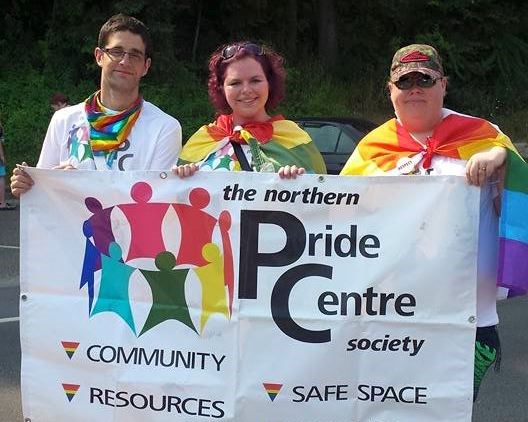University of Northern B.C. students have succeeded in securing funding for its Pride centre after a "six-year battle" for support.
"I never thought it would get this far and to see it finally after so many years of being told 'no,' after hitting that brick wall so many times, even this last year...and finally getting that email and being told you're getting that funding, is fantastic. It's the first step in the right direction," said Krystal Vandenberg, who was president this year of the Northern Pride Centre, but is now stepping back.
She called it her last big project at the organization she's been with since its inception six years ago - and an "exhausting" journey backed by many volunteers.
"I think it's great," said the 26-year-old Master of Social work student.
"Honestly to see it come to fruition as I'm closing up... to see that come to be is really, it's really emotional."
In April, administration told Vandenberg the centre would get one-time funding of $10,000 each year over two years.
The centre had requested $20,000 a year for part-time staff.
She said other groups like the Women's Centre and First Nations centre get funding from UNBC and supplement that through grants.
She's hoping the centre can adopt a similar model.
It will mean the centre, which has about 20 members and volunteers, can hire a coordinator to offer consistent hours, help create a known safe space on campus, and have a person trained in LGBTQ issues to support students in need.
"(It) seems like a small number but imagine if we didn't have the space, that would be 20 or so people that might not be okay," she said.
"If you have LGBTQ people and educated staff as well the rates of isolation, anxiety, depression, suicide will go down, for this age group."
Barb Daigle, the director of human resources who also acted as interim vice president of administration and finance, said the current senior administration became aware of the issues this spring.
"When we realized they were in such a funding crunch and weren't able to deliver any services, that's when we started talking about whether we could do something in terms of one-time funding," she said.
"I don't know if previous administrators had those conversations with them or not."
Vandenberg said the change of administration, including new president in Daniel Weeks, has made the difference.
In 2011, the then Northern Pride Centre Society, launched a letter writing campaign addressing past president George Iwama, who Vandenberg said "was not supportive."
At the time the university said student groups rely on fees paid to the Northern Undergraduate Student Society for funding. But even when it was a society, the centre didn't get funding and this year dissolved its status, Vandenberg said, because it was too costly and paperwork was too difficult to keep up on from unpaid volunteers with a high turnover. This year NUGSS voted against her request for funding but "backed the Pride Centre on an initiative to go again to administration with a proposal."
Daigle said the hope is that UNBC can pair the group up with its fund development office to develop more sustainable strategies.
"There's a strong commitment for our senior group right now for initiatives like the Pride Centre, principles around diversity and creative positive work and learning environments," Daigle said.
"We really want our students to know that this is a safe and positive environment for them and so if a group like a pride centre is active, it's just another resource for our students."
That space is key for vulnerable students, especially in the north, where isolation is an issue for all residents and even more acutely for queer-identified students.
"That tends to be heightened because we tend to have to, as the saying goes, go back into the closet... there tends to be a bit more homophobia or transphobia," Vandenberg said.
It was difficult, for example, to read some of the comments on recent articles about the city's approval of a rainbow-coloured Pride Walk in downtown Prince George.
"I'm fairly out but there have been places that I have been uncomfortable," she said.
Coming out is a constant, ongoing process.
For her, it started when she moved to Prince George for her undergraduate degree from the small farming town Vandenberg grew up in Ladner, B.C.
"My town was pretty not accepting," said Vandenberg, who first came out at age 20, but wasn't out to everyone until she was 24.
The centre can offer peer support for those who need education on that process, she said.
"Coming out can be a tiring thing, it can be a great thing but there is a lot of things that go into it. Sometimes you have to make a safety plan," she said, but the centre is there for whatever stage a person is in.
"It's somewhere you can be yourself."



